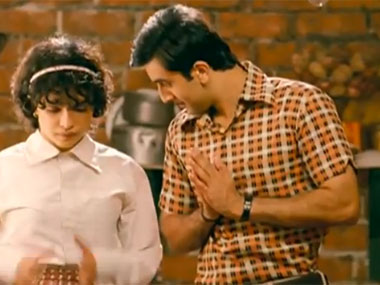
Anurag Basu’s Barfi, India’s official entry to the Oscars has achieved nothing new, The controversy in the wake of its selection has been as old as the questions about just what guides our cinema juries to select films for a foreign forum. Was an epic mess called Jeans, a Vijay Amritraj’s production, chosen because of Amritraj’s clout or was it really worthy of an Oscar long list? No prizes for guessing the right answer to that one. Barfi, initially celebrated for its lyrical purity soon began to fall apart at the seams when bloggers began to trace the many sources of ‘ inspiration’ behind the film. Television actor Mona Ambegaonkar says, “I would have liked a little gem like Paan Singh Tomar to go the Oscars but we know it would never have been selected because it critiques bitterly India’s apathy towards its athletes.” So Barfi it is though this is not the first time that plagiarism has stalked Hindi films. We borrow compulsively, without guilt or shame or attribution as if we had the right to copy what we cannot better.
**
Even Gulzar’s Parichay was a curried interpretation of The Sound Of Music. Musical classics from the 60s borrowed heavily from films like Come September. The Godfather series has ‘inspired’ generations of Indian film makers from Firoz Khan (Dharmatma) to Ram Gopal Varma (Sarkar). Sholay was inspired by The Magnificent Seven which was inspired by Seven Samurai but we have digressed. Raj Kapoor channeled Charlie Chaplin. Dev Anand was more like Gregory Peck than Gregory Peck himself.
**
Subhash Ghai’s Karz lifted its premise from The Reincarnation of Peter Proud, Firoz Khan’s Jaanbaaz had many scenes from Duel in the Sun, Amitabh Bachchan starrer Satte Pe Satta recalled Seven Brides For Seven Brothers, Rakesh Roshan’s Khoon Bhari Maang and Koi Mil Gaya were based on Return To Eden and E.T respectively. Even an ‘alternate’ film like Ek Ruka Hua Faisla was based on 12 Angry Men. Shahrukh Khan’s breakaway hit Baazigar like most Abbas Mastan films was a copy too. In this instance, of a film called A Kiss Before Dying. Films like The Hand that Rocked the Cradle, On the Waterfront, The French Kiss, Mrs Doubtfire, A Walk in the clouds, While You were Sleeping, Fatal Attraction, The Notebook, Sleeping With the Enemy, Unfaithful, Roman Holiday,Pretty Woman, It Happened One Night and Kramer Vs Kramer have been copied too, sometimes more than once. And the list continues.
**
It is not that we have not had genuinely original film makers. Dada Saheb Phalke, V Shantaram, Chetan Anand, Bimal Roy, Guru Dutt and many of their peers had cinematic voices like no other. Contemporary makers like Shyam Benegal have explored Indian literature and social fabric to give us films like Manthan, Junoon, Kalyug, Ankur and more. Makers like K Asif (Mughal E Azam) and Kamaal Amrohi (Pakeeza) were too enamoured with India’s beautiful Islamic legacy to ever look Westwards.
**
Films like Chashme Badoor, Sparsh, Katha, Sadgati, Shatranj Ke Khiladi, Mrigya, Garam Hawa, Mirch Masala, Arth, Saaransh, Sujata, Bandini and many many others across decades and genres have shown us how authentic a Hindi film narrative can be. Commercial Bollywood films too have over the years developed a certain identity that is now being borrowed by Western film makers like Danny Boyle but the fact remains that in order to stand out in foreign film festivals and award long lists, we must take pride in our own literature, our musical roots, our own rich reserves of home grown reference points. We are a nation of story tellers, staggeringly brilliant epics, folk tales, of literary figures like Ismat Chughtai, Prem Chand and Amrita Pritam to name a few. Modern Indian writers routinely win literary awards so there cannot be any reason why our films cannot tell stories without stealing their soul from somewhere else.
**
This story earlier appeared in the student edition of The New Indian Express.






